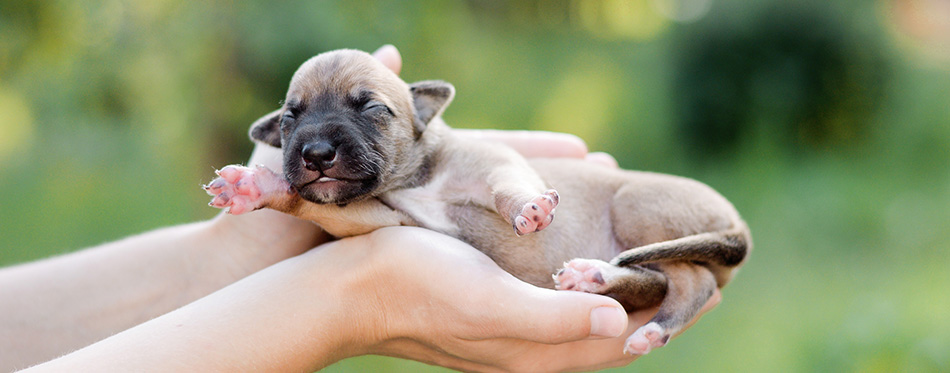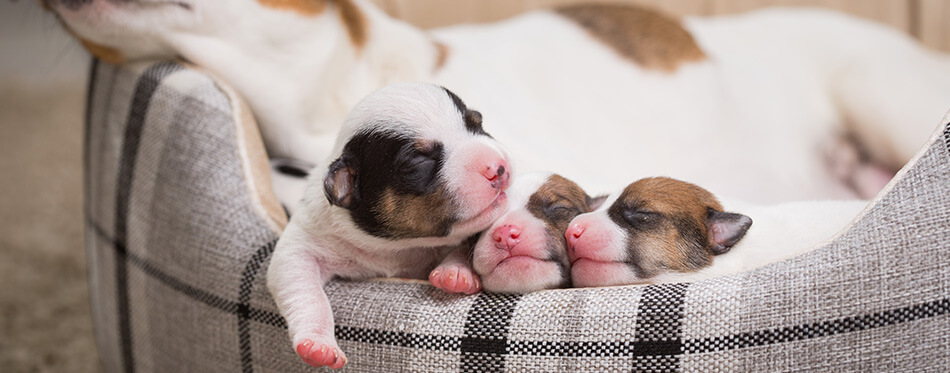Like human babies, many people respond to a newborn puppy as a delicate little bean that needs to be handled extremely carefully, where others feel newborn puppies shouldn’t be touched at all. The question, “can you touch newborn puppies?” has always been a constant query for people unfamiliar with dealing with a new litter.
Some people worry that the mother might reject her babies if they smell of human (much like with birds), others worry that if they hold newborn puppies they risk injuring them. However, touching newborn puppies is not as bad as you might think. Here, we are going to break down the myths and theories surrounding this question as well as provide helpful advice on how best to handle a newborn puppy.
Can The Mother Dog Reject Her Puppy If It Smells of Human?
Let’s address the elephant in the room first. The most common assumption when it comes to handling a puppy is whether or not a newborn puppy will be rejected by its mother if it smells like a human. This is not true. Often mother dogs that have given birth will be absolutely fine with their owners touching their puppies.
However, you need to keep in mind that the mother needs to trust her owner completely in order to let them into her whelping area or whelping box whilst she and her babies are so vulnerable. You may even find with some mother dogs that they bring their newborn pups to their owner once they are back on their feet, as a display of trust and love.
It is possible for a mother to reject her babies, but this is a very rare event and is usually triggered by one of a range of other causes, as opposed to the fact that the puppy has been touched by a human being. On the flip side, you can also get the overly protective mother that refuses to allow anyone near her babies as part of her strong motherly instinct to protect them against threats.

How to Know If a Mother Dog is Rejecting Her Babies
When mothers reject their puppies they either abandon the puppy to die or in some cases they may attempt to kill them. Immediately after your bitch gives birth it is a good idea to keep a close eye on the mother and her young puppies so that if she appears to be rejecting them you can provide human intervention to save them.
All dog owners hope that this will never happen as it puts a lot of stress on the parent dog, as well as placing the responsibility on the owner to take over the puppies’ care. Here are some telltale signs of a mother rejecting her puppies just in case the situation arises:
Absence of Licking
Ordinarily, a mother dog will immediately react to her puppies being born by licking them clean. Licking has several uses on top of bathing, including marking them with her scent and stimulating urination. If she is not licking them then this could be an indicator of a lack of interest in her puppies and their welfare.
Clear Indifference
If your female is showing little interest in her puppies and appears to be frequently lying or walking away from them, then she could be displaying her lack of interest in rearing them. At this stage, you can either encourage the mother to begin caring for her puppies, or in more severe rejection cases you may have to take over for her.
Distress From Both Sides
Newborn puppies usually spend most of their time sleeping cuddled up against their mother’s tummy, both to share in her body heat and to have easy access to food when they’re hungry. Newborns need this closeness to keep warm and to develop a bond with their mother.
A female that has chosen to reject her litter will become stressed with the constant attention from her puppies and may repeatedly pick them up and move them away from her, or even snap or growl at them when they get too close. In response, the puppies will become distressed themselves due to this treatment as well as being extremely hungry from the lack of feed time.
Killing or Eating The Newborns
This can happen when a mother does not recognize her puppies as her own – often as the result of a C-section. But it can also happen if a female suffers from post-natal depression (due to low levels of oxytocin) or is incapable of feeding her puppies. Smothering the babies is the most common approach, but there are less pleasant ways that this can be done, so you have to be quick off the mark to prevent it from happening.
Remember to Seek Help if You Need It
If your dog is pregnant and you’re worried about when the puppies arrive, it would be best to seek some professional veterinarian advice before the day comes. And if you think you may have spotted signs that your bitch might be rejecting her litter, don’t be afraid to call them up and ask how you should proceed.
If the mother is high-strung and especially stressed out she might need some care from the vet to help her cope whilst you deal with the newborns.
Handling an Orphaned Newborn Puppy
If a puppy becomes orphaned either by its mother passing away shortly after giving birth, or by rejection, human intervention is essential, and much happen immediately. Puppies require warms, puppy food, and a bond to get them through the first 8 weeks of their life.
This bond doesn’t have to be with the mother, it can also be with a human (hence the fantastic bond humans share with their pets). If you are forced to intervene and need to start handling puppies on a regular basis, here are some simple tips we can provide to help you ensure you’re not hurting them:
- Use deliberate and slow movements so as not to frighten them
- Start by gently running one or two fingers along their back to familiarize them with you
- Try to scoop the puppy up carefully -don’t lift them with your fingers under their stomach
- Keep your hands cupped around the baby at all times if possible to preserve its body temperature
- wear gloves initially in order to prevent the spread of harmful germs
- Only ever feed them whilst they’re on their stomach, not their back as they can choke
- When burping a puppy after feeding it use an extremely light touch

Approaching Newborn Pups in a Healthy Setting
So say mommy dog has given birth, all went well, she is not exhibiting signs of rejection or stress and the family appears quite happy. Leave them be. I know the first thing anyone wants to do is scoop up those little fluffy jellybeans and show them love and affection, but that is for mom to do.
Try your best to leave them be for the time being. They need at least a few days, if not a week, to get to know each other and be comfortable together before you start sticking your hands into the litter. If the mother wants you to touch her babies then she will show you.
Some mothers have been known to bring their puppies to their owners to display their enthusiasm for their owner’s involvement. However, unless your pooch shows these same signs to you then it is much better and safer to leave her be. She is likely still hurting from giving birth, and feeling vulnerable. There is no need to make her feel any more anxious than she may already be feeling.
What To Do If The Mother Becomes Aggressive
Some mothers right after giving birth become hyper-aware and anxious as their natural protection instinct kicks into high gear – this is known as maternal aggression. In the wild, a new mother would have to still keep her eyes open for any new threats in order to keep her babies safe from potential predators. Even if your dog was completely comfortable around you pre-pregnancy or even during pregnancy, she may not love you quite so much for a little while after her newborn puppies arrive.
Some new moms can perceive threats where there aren’t any. You just need to respect her desire to protect her little ones and understand that this is a hormonal change in her body that your canine companion has no control over.
How to Respond to Maternal Aggression
The best possible thing you can do in this instance is to steer completely clear of the mother and her puppies until she relaxes. This means creating an isolated space, perhaps in a room of the house with low traffic, where she can feel at ease and enjoy these early weeks of motherhood.
And under no circumstances should you handle the puppies or invite people to the house to view them, as this will result in excessive stress and anxiety for the mother which will have a knock-on impact on her puppies. Especially seeing as in extreme circumstances mothers can injure or even kill their babies if they feel they have no choice in the matter.
So, Can You Touch Newborn Puppies?
For the most part, yes. You can touch them but you must be gentle, and if you can help it try to give them at least a few days before you start touching your dear dog’s puppies. Remember to read her body language and respect her response to your presence. If she is visibly stressed by you being near her babies, leave them alone until she eases off. If she is happy to have you around, then only handle the puppies if you need to and be as gentle as possible.

